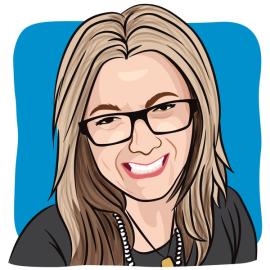- About Us
- Advertise / Support
- Editorial Board
- Contact Us
- CancerNetwork.com
- TargetedOnc.com
- OncLive.com
- OncNursingNews.com
- Terms & Conditions
- Privacy
- Do Not Sell My Information
- Washington My Health My Data
© 2025 MJH Life Sciences™ and CURE - Oncology & Cancer News for Patients & Caregivers. All rights reserved.
Finding Support in Unexpected Places Through Hereditary Cancer Advocacy

Georgia Hurst is a fierce patient advocate for those with Lynch syndrome. Her advocacy work has afforded her opportunities to write for medical journals, various websites, books and genetic testing companies, and collaborate as a stakeholder for the National Academy of Sciences: Genomics and Population Health Collaborative. She is the co-creator of #GenCSM (Genetic Cancer Social Media) on Twitter.
I share how my friendship with advocate Amy Byer Shainman helped me navigate hereditary cancer, showing that real support comes from empath and honesty.
I met Amy Byer Shainman, a passionate advocate for those with BRCA mutations, more than a decade ago during a Twitter chat. I was cracking jokes in the middle of a heavy conversation regarding surgical menopause and hot flashes when she messaged me right away -- she knew instantly that we were destined to be friends, and she was right. The rest was history.
Amy and I don't share the same mutation — she carries the BRCA1 mutation, and I have Lynch syndrome. On the surface, those look like two very different paths. But once we got to know each other, it was clear we shared a lot of the same terrain: risk-reducing surgeries, surgical menopause, the long-term side effects that nobody warns you about, and the emotional toll of being "healthy" while still living under the constant shadow of cancer.
Despite our genetic differences, we spoke the same language — the language of survival. I know many in the Lynch syndrome community share the frustration when BRCA receives more attention — more research, more visibility, and more funding. Angelina Jolie's public disclosure of her BRCA status only amplified that feeling. Who would be our Angelina, shining a light on Lynch syndrome, the most common hereditary cancer syndrome of all? I understand that anger.
But when I was diagnosed, I wanted to understand all hereditary cancer syndromes, not just Lynch. What struck me were the parallels amongst the syndromes -- the impossible choices, the gravity of generational trauma, the permanent physical changes, survivor's guilt, and the lingering fear that stays with you no matter how many surgeries you've endured. It became clear: we are all walking the same path, even if it has different names.
Amy understood that, too. She taught me a great deal about advocacy, and together we found ways to raise awareness about hereditary cancer syndromes. We believed in the same mission: no matter the mutation, every patient deserves to be heard, supported, and seen.
Not every community experience I had was so supportive. When I started writing about my oophorectomy, I received mixed feedback. Some people appreciated my honesty about the aftermath — the hormonal crash, the depression, the grief, and many other charming challenges. Others, though, complained. They worried that by speaking candidly about the aftermath of the oophorectomy, I might scare people away from having these life-saving surgeries. I wasn't trying to discourage anyone — I was telling my truth. Surgery saved my life, but it came with very real costs. I needed space to process that reality.
Amy never asked me to soften my words or tidy up my story. She knew that telling the whole truth about these procedures — the gratitude and the grief — mattered. She gave me room to be complicated, contradictory, and human. That kind of support is rare.
Beyond being a friend, Amy is an extraordinary advocate. She's known as "The BRCA Responder" on social media due to her tireless work in educating others about hereditary cancer risk. Her book, Resurrection Lily: The BRCA Gene, Hereditary Cancer, and Lifesaving Whispers from the Grandmother I Never Knew, is part memoir, part guidebook, and has helped countless people navigate the overwhelming world of genetic risk.
She has also produced influential films, including Pink & Blue: Colors of Hereditary Cancer and her latest project, Love, Danielle. These movies give a face and a voice to the hereditary cancer community, telling stories that medical journals can't capture. They show what it means to live this life — the decisions, the losses, and the resilience.
Amy is my muse every day -- not only because of what she's accomplished, but because of how she does it — with obscene quantities of empathy, honesty, and generosity. She is proof that advocacy isn't just about statistics or science; it's about humanity.
Over the years, Amy has become more than an advocate or even a friend — she's become family. The kind you choose. She has been the steady voice on the other end of the line, reminding me that I am not alone.
What I've learned from Amy is that real support isn't about pushing someone toward a particular decision or muting the more complex truths. Real support is about standing with someone, even when their story is complex to hear. It's about saying, "I see you. I hear you. And you don't have to go through this alone."
For me, Amy has been that person, and I will always be grateful.
I wish everyone had an Amy.
This piece reflects the author’s personal experience and perspective. For medical advice, please consult your health care provider.
For more news on cancer updates, research and education, don’t forget to subscribe to CURE®’s newsletters here.
Related Content:



